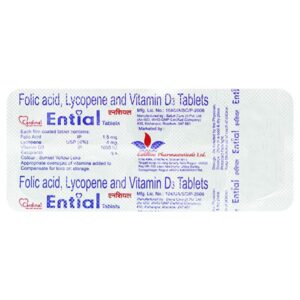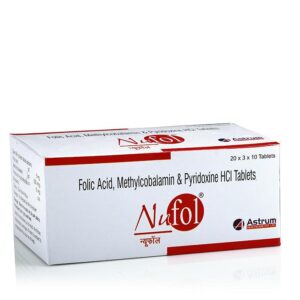FOLIC ACID + PYRIDOXINE (VITAMIN B6) + METHYLCOBALAMINE
Folic Acid: Folic acid is a form of vitamin B9, which is essential for the proper functioning of the body. It is often used as a dietary supplement or as a prescription medication to treat or prevent certain types of anemia and folate deficiency.
The main mechanism of action of folic acid is its involvement in the production of red blood cells and the synthesis of DNA and RNA. It is converted to its active form, tetrahydrofolic acid, which acts as a coenzyme in various metabolic reactions.
The recommended daily dose of folic acid varies depending on age, gender, and certain medical conditions. For most healthy adults, the recommended dietary allowance (RDA) is 400 micrograms per day. However, during pregnancy, the RDA increases to 600 micrograms per day to support fetal development.
Folic acid is generally safe for consumption, and there are minimal side effects associated with its use. However, in rare cases, some individuals may experience allergic reactions or gastrointestinal side effects such as nausea, bloating, or abdominal cramps. High doses of folic acid may also mask the symptoms of vitamin B12 deficiency, which can lead to neurological complications if left untreated.
It is important to note that folic acid supplementation should be taken under medical supervision, especially in individuals with underlying health conditions or those taking certain medications. Additionally, taking extremely high doses of folic acid without medical guidance can be harmful and can mask underlying health issues that need proper diagnosis and treatment.
Overall, folic acid is a vital nutrient that plays a crucial role in various bodily functions. It is commonly used to treat folate deficiency anemia and is frequently recommended for pregnant women to prevent neural tube defects in their babies.
Pyridoxine (vitamin B6): Pyridoxine, also known as vitamin B6, is a water-soluble vitamin that plays a crucial role in various bodily functions. It is primarily used as a dietary supplement to treat and prevent pyridoxine deficiency.
The mechanism of action of pyridoxine is through its conversion into its active form, pyridoxal phosphate (PLP). PLP acts as a coenzyme, participating in over 100 enzymatic reactions involved in protein, carbohydrate, and lipid metabolism. Additionally, pyridoxine is involved in the synthesis of neurotransmitters like serotonin and dopamine, as well as the formation of red blood cells.
Pyridoxine is commonly available in oral tablet or capsule form. The recommended daily dose of pyridoxine for adults is around 1.3-1.7 mg. However, the dosage may vary depending on the specific condition being treated. It is important to follow the dosage instructions provided by a healthcare professional or the product label.
Pyridoxine is generally considered safe when taken at recommended doses. However, high doses of pyridoxine (>200 mg per day) can lead to adverse effects. Some common side effects of excessive pyridoxine intake include sensory neuropathy (tingling or numbness in the extremities), skin lesions, photosensitivity reactions, gastrointestinal upset (nausea, vomiting, abdominal pain), drowsiness, and headache.
It is important to note that pyridoxine supplements are not without risks and should be used under the guidance of a healthcare professional. Individuals with certain conditions such as kidney disease, liver disease, or certain types of anemia should exercise caution when taking pyridoxine and consult their healthcare provider before starting supplementation. Additionally, pyridoxine can interact with certain medications, so it is essential to inform your healthcare provider about any other medications or supplements you are taking.
Methylcobalamine: Methylcobalamin is a form of vitamin B12 that is widely used as a dietary supplement and medication. This drug is essential for various bodily functions, including the production of red blood cells, the proper functioning of the nervous system, and the synthesis of DNA.
Methylcobalamin plays a crucial role in maintaining the health of nerve cells and promoting nerve regeneration. It is often used for the treatment of various neurological disorders, such as peripheral neuropathy, diabetic neuropathy, and pernicious anemia. It can also be used to supplement dietary vitamin B12 deficiency or as a nutritional boost for vegetarians and vegans who may be at risk of deficiency due to the absence of animal products in their diet.
The mechanism of action of Methylcobalamin involves its conversion into coenzyme B12 in the body, which is then involved in various enzymatic processes. Specifically, it acts as a cofactor for the enzyme methionine synthase, which is essential for the conversion of homocysteine to methionine. This conversion is important for the synthesis of DNA and the maintenance of myelin, the protective covering of nerves. By promoting these processes, Methylcobalamin helps to support the health and function of nerve cells.
The dose of Methylcobalamin can vary depending on the specific condition being treated and on individual factors. It is typically available in oral tablet form, with dosages ranging from 500 mcg to 5 mg. For deficiency management, a typical dose is 1,000 mcg per day. However, it is best to consult a healthcare professional for personalized dosing guidelines.
Methylcobalamin is generally considered safe and well-tolerated. However, like any medication, it can cause side effects in some individuals. Common side effects may include mild gastrointestinal symptoms such as nausea, diarrhea, or stomach pain. Allergic reactions are rare but possible. In very rare cases, high doses of Methylcobalamin can cause hypokalemia (low potassium levels) or exacerbate certain conditions like congestive heart failure. It is important to consult a healthcare professional if any concerning side effects occur.
Overall, Methylcobalamin is a valuable drug that plays a vital role in maintaining the health of the nervous system and treating certain neurological conditions. It is essential to use this medication under the guidance of a healthcare professional and follow the prescribed dosage to ensure maximum benefits and minimize the risk of side effects.


